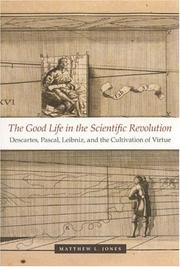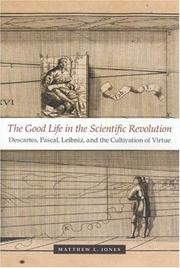| Listing 1 - 6 of 6 |
Sort by
|

ISBN: 9780226409559 0226409546 0226409554 9780226409542 Year: 2006 Publisher: Chicago : University of Chicago Press,
Abstract | Keywords | Export | Availability | Bookmark
 Loading...
Loading...Choose an application
- Reference Manager
- EndNote
- RefWorks (Direct export to RefWorks)
Amid the unrest, dislocation, and uncertainty of seventeenth-century Europe, readers seeking consolation and assurance turned to philosophical and scientific books that offered ways of conquering fears and training the mind& guidance for living a good life. 'The Good Life in the Scientific Revolution' presents a triptych showing how three key early modern scientists, Rene; Descartes, Blaise Pascal, and Gottfried Leibniz, envisioned their new work as useful for cultivating virtue and for pursuing a good life. Their scientific and philosophical innovations stemmed in part from their understanding of mathematics and science as cognitive and spiritual exercises that could create a truer mental and spiritual nobility. In portraying the rich contexts surrounding Descartes' geometry, Pascal's arithmetical triangle, and Leibniz's calculus, Matthew L. Jones argues that this drive for moral therapeutics guided important developments of early modern philosophy and the Scientific Revolution.
Mathematics --- Science --- Philosophy --- History --- Moral and ethical aspects. --- Descartes, Rene. --- Descartes, René. --- Leibniz, Gottfried Wilhelm. --- Mathematics. --- Mathematics - Philosophy - History - 17th century. --- Pascal, Blaise. --- Science - History - 17th century. --- Science - Moral and ethical aspects. --- Science. --- Physical Sciences & Mathematics --- Sciences - General --- Moral and ethical aspects --- Descartes, René, --- Pascal, Blaise, --- Leibniz, Gottfried Wilhelm,

ISBN: 1281957232 0226409562 9786611957230 9780226409566 9781281957238 0226409546 0226409554 9780226409542 9780226409559 6611957235 Year: 2006 Publisher: Chicago University of Chicago Press
Abstract | Keywords | Export | Availability | Bookmark
 Loading...
Loading...Choose an application
- Reference Manager
- EndNote
- RefWorks (Direct export to RefWorks)
Amid the unrest, dislocation, and uncertainty of seventeenth-century Europe, readers seeking consolation and assurance turned to philosophical and scientific books that offered ways of conquering fears and training the mind-guidance for living a good life. The Good Life in the Scientific Revolution presents a triptych showing how three key early modern scientists, René Descartes, Blaise Pascal, and Gottfried Leibniz, envisioned their new work as useful for cultivating virtue and for pursuing a good life. Their scientific and philosophical innovations stemmed in part from their understanding of mathematics and science as cognitive and spiritual exercises that could create a truer mental and spiritual nobility. In portraying the rich contexts surrounding Descartes' geometry, Pascal's arithmetical triangle, and Leibniz's calculus, Matthew L. Jones argues that this drive for moral therapeutics guided important developments of early modern philosophy and the Scientific Revolution.
Science --- Mathematics --- Science and ethics --- Math --- History --- Philosophy --- Moral and ethical aspects. --- Descartes, René, --- Pascal, Blaise, --- Leibniz, Gottfried Wilhelm, --- Leibnitz, Gottfried Wilhelm --- Leibniz, Gottfried Wilhelm --- Pascal, Blaise --- Montaltius, Ludovicus --- de Montalte, Louis --- Descartes, Renatus --- Cartesius, Renatus --- Montalte, Louis de, --- Pasukaru, Burēzu, --- Paskalʹ, Blėz, --- Pascal, Biagio, --- Pʻa-ssu-kʻa-erh, Pu-lai-tzu, --- Pa-ssu-ka, Pa-ssu-chia-erh, --- Pa-ssu-chʻieh-erh, Pa-ssu-chʻia, --- Ppasŭkkal, --- Montaltius, Ludovicus, --- פסקל, בלז --- פסקל, ב., --- virtue, leibniz, pascal, descartes, philosophy, scientific revolution, consolation, purpose, suffering, meaning, morality, ethics, assurance, comfort, science, religion, faith, spirituality, cognition, personal growth, mathematics, discipline, nobility, calculus, arithmetical triangle, geometry, moral therapeutics, history, disproportion, truth, expression, nonfiction. --- 파스칼 --- Descartes, Rene,
Book
Year: 2016 Publisher: Chicago : University of Chicago Press,
Abstract | Keywords | Export | Availability | Bookmark
 Loading...
Loading...Choose an application
- Reference Manager
- EndNote
- RefWorks (Direct export to RefWorks)
From Blaise Pascal in the 1600s to Charles Babbage in the first half of the nineteenth century, inventors struggled to create the first calculating machines. All failed-but that does not mean we cannot learn from the trail of ideas, correspondence, machines, and arguments they left behind. In Reckoning with Matter, Matthew L. Jones draws on the remarkably extensive and well-preserved records of the quest to explore the concrete processes involved in imagining, elaborating, testing, and building calculating machines. He explores the writings of philosophers, engineers, and craftspeople, showing how they thought about technical novelty, their distinctive areas of expertise, and ways they could coordinate their efforts. In doing so, Jones argues that the conceptions of creativity and making they exhibited are often more incisive-and more honest-than those that dominate our current legal, political, and aesthetic culture.
Calculators --- Computers --- Technology --- History. --- Blaise Pascal. --- Charles Babbage. --- Charles Mahon, 3rd Earl Stanhope. --- Gottfried Wilhelm Leibniz. --- artisanal knowledge. --- calculating machines. --- eighteenth century. --- intellectual property. --- nineteenth century. --- seventeenth century.
Book
ISBN: 9780226411460 022641146X 9780226411637 022641163X Year: 2016 Publisher: Chicago London
Abstract | Keywords | Export | Availability | Bookmark
 Loading...
Loading...Choose an application
- Reference Manager
- EndNote
- RefWorks (Direct export to RefWorks)
"Tells the story of early modern European calculating machines, from the early attempts of Blaise Pascal in the 1640s through Charles Babbage{u2019}s efforts of the 1820s to 40s. All failed spectacularly. By exploring these failed technologies, Matthew L. Jones tracks diverse forms of technical life--different social arrangements of practitioners, different legal conceptions of the ownership of work and ideas, and different philosophical conceptions of knowledge and skill. Philosophers, engineers, and craftspeople wrote about their distinctive competencies, about technical novelty, and about the best way to coordinate their efforts, and drawing on these remarkably well-preserved records, Jones reveals the concrete processes of imagining, elaborating, testing, and building key components for calculating machines. By highlighting the makers and their conceptions of invention right up to the instauration of modern patent regimes and the solidification of the concept of Romantic genius, Jones argues that these conceptions of creativity and of making are often more incisive--and more honest--than those still dominating our own legal, political, and aesthetic culture."--Provided by publisher.
Calculators --- Computers --- Technology --- History --- History --- History
Book

ISBN: 9780231550680 0231550685 9780231194167 9780231194174 Year: 2020 Publisher: New York, NY
Abstract | Keywords | Export | Availability | Bookmark
 Loading...
Loading...Choose an application
- Reference Manager
- EndNote
- RefWorks (Direct export to RefWorks)
Digital

ISBN: 9780231550680 9780231194167 Year: 2020 Publisher: New York, N.Y. Columbia University Press
Abstract | Keywords | Export | Availability | Bookmark
 Loading...
Loading...Choose an application
- Reference Manager
- EndNote
- RefWorks (Direct export to RefWorks)
| Listing 1 - 6 of 6 |
Sort by
|

 Search
Search Feedback
Feedback About UniCat
About UniCat  Help
Help News
News